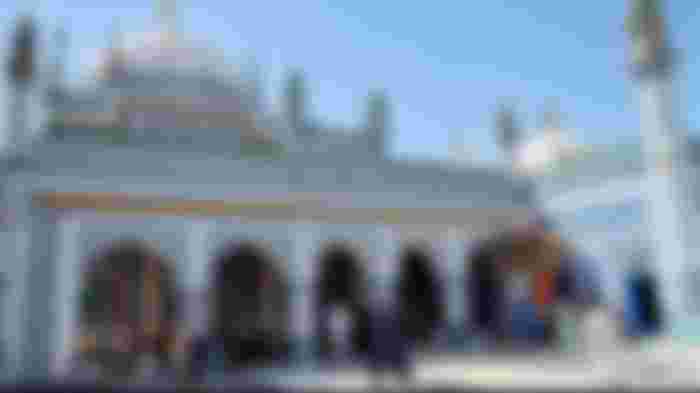
Saint refers to a person who is accepted to hold the highest position of holiness or has extraordinary proximity or resemblance to God. In Islam It is called Wali. Like Islam and Christianity, other religions have the concept of saints with different names.
In Islam, the saints (Auliyas) have a high status, often known as wali, and are considered friends, helpers, subservient, occupants, beloved Allah, close God, elder religion, foot and mentor, Zahid, Parsa, Pyaar Zagar, Nek Bakht, Arif, Sabir, Shakar, Abid, and Salik.
In some parts of Islam, Wali was denied in the twentieth century because of Salafism. From the early stages, the saints are highly respected in the Ahl al-Sunnah, and the saints (Auliyas) were considered to be a god-chosen group of the eighth century who were capable of performing karma. According to Sunni-Islamic belief, Auliya had many miracles (Karamat al-Awalia).
Lal Shahbaz Qalandar
( Sufi wali, philosopher and poet )

Lal Shahbaz Qalandar (1177 - 1274) whose real name was Syed Usman Marundi, Madfon was a famous Sufi elder in Sindh. His shrine is in Sihon Sharif area of Sindh. He was a famous Sufi elder, poet, theologian, philosopher, and qalandar. His time is famous in the time of the Auliyas. Famous elders Sheikh Bahauddin Zakariya Multani, Sheikh Fariduddin Ganj Shakar, Shams Tabrizi, Makhdoom Abdul Rashid Haqqani, Jalaluddin Romi, and Syed Jalaluddin Lal Bukhari, Makhdoom Sadruddin Qatal, Sadruddin Arif (son Baha al-Ad) Sheikh Bo Ali Qalandar Panipati was a close contemporary of him. Lal Shahbaz Qalandar is considered equally well known among followers of all religions because of the preaching of religious tolerance among Hindus and Muslims. Since his kharka was bright or powerful, he was called "Lal", "Shahbaz" because of his godliness and nobility, and "Qalandar" because of his al-Qalandar in. Lal Shahbaz Qalandar is the most famous Sufi song in all the countries of the subcontinent, India, Pakistan, Afghanistan, and Bangladesh. The song was originally written in the thirteenth century AD and has been sung by many musicians and singers since then and has been extremely popular in every era.
Lal Shahbaz's homeland was Marund, the city of Marund is some distance from Tabriz, also known as Mewand. This city is very ancient. The city was then the Capital of Azerbaijan. Famous for its beautiful view on the banks of the river. Yashakti wrote that this city was enthroned by the Kurds. After the Invasion of the Kurds, the fort was destroyed, and the city was destroyed.
The Kurds took the ahl al-Marund as their slave. For a long time, the dust flew here. The city remained empty for a long time from the human population. A look at Mastuni shows that the city was located on the Rud Canal. There was a lot of scope for this canal. Nine hands flowed inside the ground. The prosperity and glory of Marand had disappeared. The city was famous for its clothes. The red ness of the red ness comes in history that many settlements were situated on the outskirts of this city.
These facts show that your real homeland is Azerbaijan and the correct name of the city is Marand. It is not surprising that marand arises from death.
His shrine is in Sihon Sharif, Sindh. It is a high model of Sindhi construction and was built in 1356. Its interior is close to 1,000 square yards. Their annual urs is on 18 Sha'baan al-Mazam according to the Islamic calendar.
During the reign of Feroz Shah, Malik Rukuddin alias Akhtaruddin Wali Sivastan built your roza. Then, in 993 A.D., mirza jani baig tarkhan, the last king of the Tarkhani family, expanded and modified your custom. Then, in 1009, Mirza Ghazi Baig Tarkhan, son of Mirza Jani Baig Tarkhan, re-conducted a meme in his province.
Shah Abdul Latif Bhattai
Sufi poet

Shah Abdul Latif Bhattai (Sindhi language, Shah Abdul Latif Bhattai) was the great Sufi poet of the subcontinent. Through your poetry, you conveyed the message of Allah and His Messenger to the common people.
Shah Abdul Latif Bhattai was born in 1689, 1101 AD in Halla Tehsil of the present district of Matiari. Your father Syed Habib Shah lived in Hala Haveli. And the author was one of the chosen beings of this area.
Shah Sahib is famous for his birth that Syed Habib Shah married three times in succession but lost his children. You mentioned your deprivation to a darwish kamil, whose name is said to be Grami Abdul Latif. He prayed that inshallah you would mean. I wish you would name your son Abdul Latif after me. If God wills, he will be employed alone in terms of his qualities.
Syed Habib Shah's first wife had a child. According to Darwish's wishes, he was named Abdul Latif. But he died as a child. Then when another son was born from the same wife, he was renamed Abdul Latif. The same boy went on to get a really young job as Darwish predicted.
Shah Abdul Latif Bhattai is also known as "Poet of Sat Surmion".
A few days after the birth of King Abdul Latif Bhattai, his father left his native village and moved to Kotri. Panj was sent to the famous school of Akhund Noor Muhammad at the age of six for knowledge tehsil. It is a common tradition that Shah Sahib refused to read anything but Alf.
In the days when Shah Habib settled in Kotri, a respected family of Mirza Mughal Baig Argon lived in Kotri. Shah Habib's purity and seniority greatly influenced mughal bags. A few days later, he joined the Maredas with his entire family. Whenever someone had any illness in Mirza's house, Shah Habib was called for prayers. Although mirza's house had a strict screen, the ritual was completely abolished for King Habib. The house's mastorah sat in front of them without hesitation, and avoided the calls that came with prayer as needed.
He reformed people with Sindhi poetry. Shah Jo Rasalu is a great effort of yours.
His word is called "Shah Jo Rasalo"
In 1752, at the age of 63, he coached bhat shah from this world. Urs celebrations of King Abdul Latif Bhattai are held every year on this day.
sachal sarmast

Sachal Sarmast (born 1152 AD/1739 – died: 14 Ramadan 1242 AD/11 April 1827) was a famous Sufi poet of Sindhi language. In general, poets are called week languages because your word is found in seven languages. Arabic, Sindhi, Seraiki, Punjabi, Urdu, Persian and Baluchi Sachal Sarmast were born in 1739 in a religious family in the small village of Draza in the former state of Khairpur.
His real name was Abdul Wahab, but seeing his candour, people called him Sachal, the Truth-Teller. Later, seeing the flames of his poetry, he was also called Sarmast.
Sachal Sarmast was born in a traditional religious family in Sindh, but he broke his family and then religious traditions in his poetry and bridged the hindu-Muslim gap in his concerts. Many Hindus are among his devotees. Sachal Sarmast was convinced of unity in Sufism.
There is a distance of seventy years in the lives of King Abdul Latif Bhattai and Sachal Sarmast. When Sachal came into Sufi poetry seventy years later, his uniqueness was also unique. Along with him, the music of Sufism also travelled to Sarmasti, and the style of the sachal fakirs from the relatively slow-tone fakirs of Shah Bhattai was unique and frank.
Sachal Sarmast lived in the kalhora and Talpur rulers of Sindh during a period when religious extremism was at its peak. Seeing the religious hatreds around him, he said in Sindhi:
مذہبن ملک میں ماٹھو منجھایا، شیخی پیری بیحد بھلایا۔
The simple translation of which is such that religions have disappointed people in the country and the boasts, peri have thrown them into the maze.
Sachal Sarmast died at the age of ninety in 14 Ramadan 12422 AD. They were married but have no children. He received his basic Arabic Persian education from his family elder, his uncle Murshid and father-in-law Khawaja Abdul Haq.
The word of Sachal Sarmast is present in Sindhi43, Urdu, Arabic, Persian and Seraiki. He and the fakirs who recite his words also have a unique place in Sindh because whenever religious extremism is challenged at any concert, support is still taken today.



